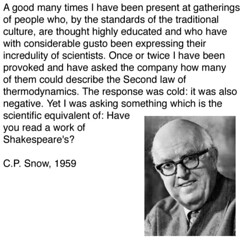Or, Zangoria Was Right
(Correction: The names Brooks ascribed may be off, but the argument is essentially correct)

Nowadays, specialists -- especially hard science specialists -- do nearly all the heavy lifting in the intelligence services, and they have been doing so for some time. The humanities have, since the unfortunate politicization of academia in the 1960s, acquired a "Lilly-livered liberal" patina (Averted Gaze) which makes them less desirable at intelligence gathering. Those arguments against the effectiveness of generalists in the field are usually put forward --ignorantly -- by minds untaxed by the rigors of either Shakespeare's meditations on man, or Socratic Irony. (The Corsair sniffs haughtily, sips a Napoleonic brandy)
David Brooks rightly argues in his NYTimes Op Ed today that the liberally educated generalist is capable of the imaginative sweeps necessary to help America's embattled intelligence networks which suffer (so says the bipartisan Intelligence committee), among other things, from a nasty case of Groupthink. The requisite "Chattering Class" mention of Blink should not distract us from following the keen argument):
"A new paper by a Yale undergraduate, Sulmaan Wasif Khan, contrasts these two ways of looking at the world. Khan compares the C.I.A.'s 1960's-era National Intelligence Estimates on China, which have been recently declassified, with the work of generalist scholars like Donald Zagoria.
"The C.I.A.'s intelligence estimates are what you'd expect: bloodless compilations of data by anonymous technicians. They do not draw patterns based on an understanding of Chinese history or make generalizations about the ethos of the Chinese elite.
"Zagoria's approach was quite different. Relying on a deep understanding of Chinese history and society, he made novelistic judgments about the Chinese leadership's hopes and fears. He imagined how we must appear to the Chinese, and how different American moves would be interpreted.
"The C.I.A. analysts concluded on Nov. 12, 1970, that there was little prospect of improvement in Sino-American relations. Zagoria said China would be open to a rapprochement.
"Zagoria was right."
Of course he was. All this reminded me of Liam Hudson and CP Snow's "Two Cultures," on the breakdown of communication between the hard sciences -- like the Edge.org camp -- and the humanities, like the proponents of The Great Books. And ... never the twain shall meet.
Now, who was Liam Hudson? According to the The Times of London:
"LIAM HUDSON was a psychologist, educator and celebrated explorer of ideas. An original thinker always alertly attuned to contemporary culture, he was admired for his intellectual style and the felicity with which he expressed his ideas in his many books and articles.
".. His astonishing first book, Contrary Imaginations (1966), reflected the thinking of the times ? C. P. Snow had published his influential analysis of the two opposed 'cultures' of science and art in 1959. Hudson, on the basis of the Getzels-Jackson test (one question: How many uses can you think of for a brick?) given to 95 schoolboys, differentiated two intellectual types: convergers and divergers. Convergers, specialising in mathematics and physical sciences, thought literally, prosaically and predictably; divergers, geared to the arts, were capable of surprising cognitive leaps."
And with Lawrence Summers' comments on the cognition of women, as well as questions what actually constitutes consciousness -- Terry Sciavo, Pope John Paul II -- we are at a peculiar crossroads of a societal conversation on the nature of cognition. Back to Liam Hudson"
"These ideas were taken further in two more influential books, Frames of Mind (1968) and The Cult of the Fact (1972). Hudson aimed to refute the claim that scientific findings were value-free; he insisted that no matter how 'objective' the research, the investigator?s presuppositions were always in operation."
Investigator's presuppositions always in operation, you say. Curious. That would go a long way in explaining the disgustingly disingenuous Bell Curve (exaggerated cough suggesting feigned detachment).
And Reuters on the commission's findings, "The commission's report warned that U.S. intelligence knows 'disturbingly little' about the nuclear programs of potential U.S. adversaries such as Iran and North Korea."
Something needs to be done, and fast. Perhaps it's time to try a marriage of convenience: The generalist and hard scientist, for the safety of the commonweal. (And the lion shall lay down with the lamb ...)
1 comment:
Indeed, the those humanities people who have that ""Lilly-livered liberal" patina (Averted Gaze) which makes them less desirable at intelligence gathering" makes it hard for us classical liberal humanities people who believe in rigor and excellence to get invited much of anywhere. And since they run the university departments, they don't much care for our presence, either, making jobs hard to come by. Thus, we lose out doubly because of them.
Post a Comment